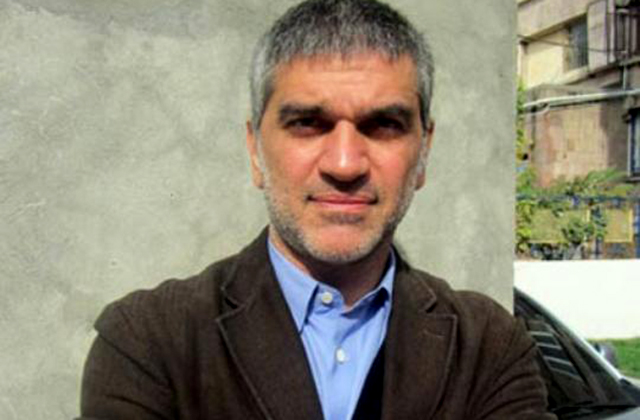“Armenia toughens its position or received a red light from Moscow”

Interview with Kayts Minasyan, analyst at the Center of Strategic Studies (France), Doctor of Political Sciences.
Recently the Azerbaijani side again launched offensive operations on eastern and southern directions of Karabakh-Azerbaijan contact line, sharply escalating the situation. On account of current dynamics of West-Russia relations, regional developments, deadlock situation of negotiations, Azerbaijani domestic issues, how realistic is wide-scale war on the conflict zone?
Threat for a wide-scale war is always existent, as NK conflict peaceful settlement process, the dynamics on the conflict zone has undergone serious changes throughout recent 2-3 years, i.e. we appeared on a new milestone after the 2016 four-day war. Automatically Armenians will be more ready for the war, than a year ago, as currently they’re getting prepared for a wide-scale war, as negotiations, as you mentioned, appeared in a deadlock, and decisions by OSCE can’t be urged to the parties to the conflict, which Armenia perfectly realizes.
There is only one power in the world, which adopts decisions subject to mandatory implementation, it’s OSCE MG, however, the latter can’t urge decisions on parties to the conflict. MG can’t do anything today, rather than encouraging, proposing, calling on, supporting to settle the conflict, however, it can’t urge. Apparently, as long as MG doesn’t condemn the attacking side, the situation will continue this way.
Why can’t MG make such a decision, initiate a radical step, if it condemns Azerbaijan, the latter will introduce it as a step beyond MG liabilities, breaking that format. Such a threat exists. I don’t consider that it’ll break down, however, the Azerbaijani side works in this direction.
At the moment the Co-Chairs don’t support Azerbaijan, it refers Russia, the USA, France. The Azerbaijanis feel, that not only negotiations, but also their situation is at a deadlock. Even if there are internal, economic, domestic, foreign policy issues, the Azerbaijani will have to do what they do, as they have no other way out. Thus, probably from 1991-1992 to present they state the same: “no concession to Armenians.” Probably they undergo bigger defeat, again will continue their claims. Armenian diplomacy perfectly realizes this, however, the point is how they should move forward.
OSCE MG can’t urge decisions to the parties to the conflict, the West, the countries, which exert mediation efforts or are interested in stability of the region, by which steps can they impact on the situation? How interested are they in not turning the conflict into wide-scale clashes?
Azerbaijanis attentively follow weak points of the international community, attempt to gain from them, i.e. if Russia, the USA and France jointly address to put an end to this, Azerbaijanis can’t continue. I consider we have reached to this point, neither the West, nor Russia are ready to support Azerbaijan, as war in Karabakh isn’t beneficial for Russia; the West, Iran and Turkey don’t need it either.
Thus, all the participants intend to encourage, urge indirectly, that negotiations were launched, there is no other way out. No matter how long Azerbaijanis will proceed with sabotage operations and war strategy, apparently, Russian and Western mediators are “getting bored.” In all likelihood, they will state that they should either negotiate or responsibility of further implications lie on Azerbaijan.
Azerbaijanis considered that the Armenia side is in the same situation, like it used to be 1-2-3 years ago. However, it became clear from recent statements by Russia, that Armenia’s weakening doesn’t serve their interests, Russia’s attitude toward Armenia has changed a bit by not only providing “Iskander”, armaments to Armenia, but also Russia’s attitude has changed in a wider context.
Will Russia act in favor of Armenia? What do you think what resulted in this change?
Russia hinted that Armenia’s weakening moves to a four-day war, which doesn’t serve its interests, as they don’t need another war. They need just the contrary. They need to show the whole world, that they support peace, move the sides to peace, stabilize the region, i.e. they appear as a stabilizing factor. Russia pursues this policy for the reason that it doesn’t want entry of new actors on NK conflict peaceful settlement process, in particular, Turkey is meant.
Recently Armenian Defense Minister Vigen Sargsyan, we may say, has warned the Azerbaijani side, if necessary, Armenia will use “Iskanders”. In your opinion, will this become a restricting factor for Azerbaijan, and how free is Armenia to use them against Azerbaijan without agreeing it with Moscow?
It’s important here that such a statement is heard on such level for the first time. Such a statement means that Armenia decided to assume a tougher position or received a green light from Moscow. In case of any of these two options we’ll touch upon the same results: Armenia won’t go to any concession, there is no other way out.
Armenians saw that in some sense Russia won’t continue weakening Armenia, and Armenians, fortunately, use this circumstance.
Armenians, our guys showed last year that they are able to show rather mighty, string opposition, and Russians have to take this factor into consideration. Russia’s history shows that they always respect power, powerful speech, powerful forces.
Currently authority of CSTO is important for Russia as well, as other organizations, founded since independence—from CIS to EEU, don’t function, they don’t move, they are broken organization, thus, Russians will have to give importance to this organization, so that at least the international community saw that in some sense this organization works and has power. Thus, it’ll attempt to focus its policy to that end. Armenia and the Diaspora should rely on Armenian soldier, as Armenia’s security guarantor are those 18 year-old young men on the border and on the contact line.
By Araks Martirosyan

























